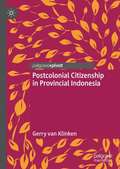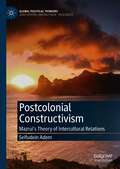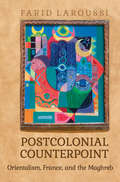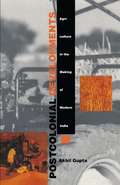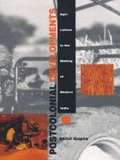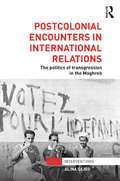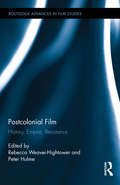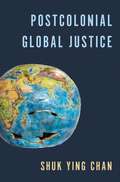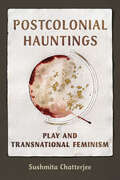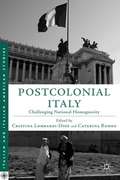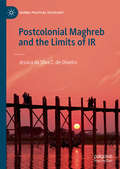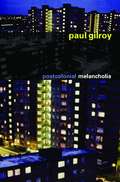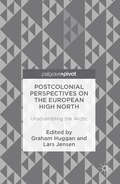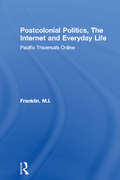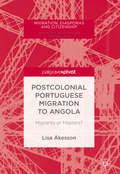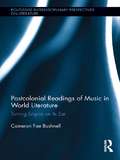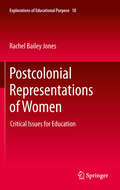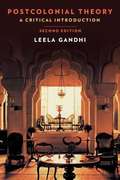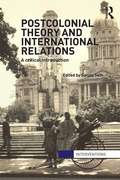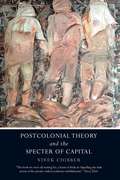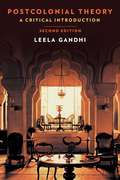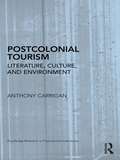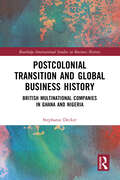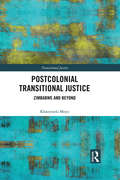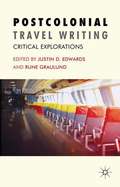- Table View
- List View
Postcolonial Citizenship in Provincial Indonesia
by Gerry van KlinkenThis book examines the history of state formation in postcolonial Indonesia by starting with the death of Jan Djong, an activist and a former village head in the little town of Maumere. It historicizes contemporary debates on citizenship in the postcolonial world.Citizenship has been called the “organizing principle of state-society relations in modern states”. Democratization is today most intense in the non-Western, post-colonial world. Yet “real” citizenship seems largely absent there. Only a few rights-claiming, autonomous, and individualistic citizens celebrated in mainstream literature exist in post-colonial countries.In reflecting on one concrete story to examine the core dilemmas facing the study of citizenship in postcolonial settings, this book challenges ethnocentricity found within current scholarly work on citizenship in Europe and North America and addresses issues of institutional fragility, political violence, as well as legitimacy and aspirations to freedom in non-Western cultures.
Postcolonial Constructivism: Mazrui's Theory of Intercultural Relations (Global Political Thinkers)
by Seifudein AdemThis book introduces Ali Mazrui’s delightfully stimulating scholarship about intercultural relations, calling it Postcolonial Constructivism, and shares elements of his intellectual vitality in an original way. It begins with a chronicle of Mazrui’s eventful, sixty-year journey as a scholar of International Relations. It then proceeds to present some of the most remarkable yet least remarked up on features of his intellectualism, including his paradoxes, his perceptive typologies, his neologisms as well as his interactions with historical figures. The book draws on materials which were either unavailable until now or were found scattered in time and space. Designed as an invitation to a wider audience to the supermarket of Mazrui’s ideas, this book also seeks to underscore the timeliness and possible durability of many of his observations about intercultural relations.Thorough, comprehensive and up-to-date, this book is a concise account of the core of Mazrui’s vast body of work. 'Seifudein Adem has done a great service to all of us who focus on learning about and publicizing the contributions of global south scholars to current Western-dominant international relations approaches. In this well-organized work, he manages to synthesize the prolific intellectual contributions of the consummate and outstanding African scholar Ali Mazrui, using what he calls 'postcolonial constructivism', while making clear that Mazrui’s work cannot solely be restricted to prevailing perspectives. At the same time, his personal friendship and close working relationship with Mazrui allow him to offer the reader a unique glimpse of the witty Africanist who was befriended by so many, including major political figures. Given the current drive to “globalize” international relations, this book is a timely contribution that highlights the overlooked, rich narratives of scholars and thinkers from the global south.' —Jacqueline Anne Braveboy-Wagner, Professor, The City University of New York, USA'Ali Mazrui’s remarkable corpus lives, and Seifudein Adem interprets it for today when its salience is undeniable around race, religion etc. Adem’s decade with the maestro maximizes his book’s insights for Africa and the world as both are in flux.'—Timothy M. Shaw, Adjunct Professor, Carleton University and University of Ottawa, Canada'Passionate about preserving African culture and the dignity of her people, Ali Mazrui was never oblivious to the forces of globalization, positive or negative, and hence the emergence of a world federation of cultures in which his scholarship lived, moved and had its being. He was a global scholar who contributed immensely to the analysis and interpretation of various aspects of international relations, social conflicts, the human condition and the future of humankind in a changing world. His ideas quite often sprang from lived experiences and discourses from which he churned chains of books and articles whose styles were peculiar to himself in what came to be referred to as 'Mazruiana'. This book finally tells the story of the genesis and evolution of this body of thought and its contribution to knowledge.'—P. Anyang’ Nyong’o, Professor and Kenyan Politician, Kenya'This is the ultimate compendium of Ali Mazrui’s interactions with men and women of power, among others, including several presidents and prime ministers. It also captures Mazrui’s unique approach to scholarship and has a large collection of his deeply thoughtful paradoxes and analytical categories.'—Amadu Jacky Kaba, Professor, Seton Hall University, USA
Postcolonial Counterpoint: Orientalism, France, and the Maghreb (University of Toronto Romance Series)
by Farid LaroussiPostcolonial Counterpoint is a critical study of Orientalism and the state of Francophone and postcolonial studies, examined through the lens of the historical and cross-cultural relations between France and North Africa. Thoroughly questioning the inability of Western academia to shake free of universalism and essentialism and come to grips with the Orientalism within postcolonial discourse, Farid Laroussi offers a cultural tour d'horizon which considers André Gide's writing on Algeria, literature by French authors of Maghrebi descent, and the conversation surrounding secularism and the headscarf in France. A provocative investigation of the place of Muslims and Islam in Francophone culture, Postcolonial Counterpoint asks how we must proceed if postcolonial studies is to make a difference in reconciling history, identity, citizenship, and Islam in the West.
Postcolonial Developments: Agriculture in the Making of Modern India
by Akhil GuptaThis definitive study brings together recent critiques of development and work in postcolonial studies to explore what the postcolonial condition has meant to rural people in the Third World. Focusing on local-level agricultural practices in India since the "green revolution" of the 1960s, Akhil Gupta challenges the dichotomy of "developed" and "underdeveloped," as well as the notion of a monolithic postcolonial condition. In so doing, he advances discussions of modernity in the Third World and offers a new model for future ethnographic scholarship. Based on fieldwork done in the village of Alipur in rural north India from the early 1980s through the 1990s, Postcolonial Developments examines development itself as a post-World War II sociopolitical ideological formation, critiques related policies, and explores the various uses of the concept of the "indigenous" in several discursive contexts. Gupta begins with an analysis of the connections and conflicts between the world food economy, transnational capital, and technological innovations in wheat production. He then examines narratives of village politics in Alipur to show how certain discourses influenced governmental policies on the green revolution. Drawing links between village life, national trends, and global forces, Gupta concludes with a discussion of the implications of environmentalism as exemplified by the Rio Earth Summit and an examination of how global environmental treaties may detrimentally affect the lives of subaltern peoples. With a series of subtle observations on rural politics, nationalism, gender, modernization, and difference, this innovative study capitalizes on many different disciplines: anthropology, sociology, comparative politics, cultural geography, ecology, political science, agricultural economics, and history.
Postcolonial Developments: Agriculture in the Making of Modern India
by Akhil GuptaThis definitive study brings together recent critiques of development and work in postcolonial studies to explore what the postcolonial condition has meant to rural people in the Third World. Focusing on local-level agricultural practices in India since the "green revolution" of the 1960s, Akhil Gupta challenges the dichotomy of "developed" and "underdeveloped," as well as the notion of a monolithic postcolonial condition. In so doing, he advances discussions of modernity in the Third World and offers a new model for future ethnographic scholarship. Based on fieldwork done in the village of Alipur in rural north India from the early 1980s through the 1990s, Postcolonial Developments examines development itself as a post-World War II sociopolitical ideological formation, critiques related policies, and explores the various uses of the concept of the "indigenous" in several discursive contexts. Gupta begins with an analysis of the connections and conflicts between the world food economy, transnational capital, and technological innovations in wheat production. He then examines narratives of village politics in Alipur to show how certain discourses influenced governmental policies on the green revolution. Drawing links between village life, national trends, and global forces, Gupta concludes with a discussion of the implications of environmentalism as exemplified by the Rio Earth Summit and an examination of how global environmental treaties may detrimentally affect the lives of subaltern peoples. With a series of subtle observations on rural politics, nationalism, gender, modernization, and difference, this innovative study capitalizes on many different disciplines: anthropology, sociology, comparative politics, cultural geography, ecology, political science, agricultural economics, and history.
Postcolonial Encounters in International Relations: The Politics of Transgression in the Maghreb (Interventions)
by Alina SajedPostcolonial Encounters in International Relations examines the social and cultural aspects of the political violence that underpinned the French colonial project in the Maghreb, and the multi-layered postcolonial realities that ensued. This book explores the reality of the lives of North African migrants in postcolonial France, with a particular focus on their access to political entitlements such as citizenship and rights. This reality is complicated even further by complex practices of memory undertaken by Franco-Maghrebian intellectuals, who negotiate, in their writings, between the violent memory of the French colonial project in the Maghreb, and the contemporary conundrums of postcolonial migration. The book pursues thus the politics of (post)colonial memory by tracing its representations in literary, political, and visual narratives belonging to various Franco-Maghrebian intellectuals, who see themselves as living and writing between France and the Maghreb. By adopting a postcolonial perspective, a perspective quite marginal in International Relations, the book investigates a different international relations, which emerges via narratives of migration. A postcolonial standpoint is instrumental in understanding the relations between class, gender, and race, which interrogate and reflect more generally on the shared (post)colonial violence between North Africa and France, and on the politics of mediating violence through complex practices of memory.
Postcolonial Film: History, Empire, Resistance (Routledge Advances in Film Studies #30)
by Peter Hulme Rebecca Weaver-HightowerPostcolonial Film: History, Empire, Resistance examines films of the later twentieth and early twenty-first centuries from postcolonial countries around the globe. In the mid twentieth century, the political reality of resistance and decolonization lead to the creation of dozens of new states, forming a backdrop to films of that period. Towards the century’s end and at the dawn of the new millennium, film continues to form a site for interrogating colonization and decolonization, though against a backdrop that is now more neo-colonial than colonial and more culturally imperial than imperial. This volume explores how individual films emerged from and commented on postcolonial spaces and the building and breaking down of the European empire. Each chapter is a case study examining how a particular film from a postcolonial nation emerges from and reflects that nation’s unique postcolonial situation. This analysis of one nation’s struggle with its coloniality allows each essay to investigate just what it means to be postcolonial.
Postcolonial Global Justice
by Shuk Ying ChanA new account of global justice that recovers anticolonial thought for resisting a neocolonial agePoliticians and activists today turn to the language of decolonization to call attention to such issues as cultural and linguistic decline, exploitative foreign investment, and global institutions dominated by superpowers. But does anticolonial thought really provide a model for reimagining world politics? The history of decolonization has not resulted in the liberating transformations that many envisioned. In Postcolonial Global Justice, Shuk Ying Chan proposes a new account of postcolonial global justice centered around the value of social equality. Drawing on the thought of Aimé Césaire, Frantz Fanon, Kwame Nkrumah, and Jawaharlal Nehru, Chan argues that a central theme in anticolonial thought is the rejection of hierarchy and the embrace of equality. These ideas from decolonization, she suggests, give us tools for critiquing contemporary global hierarchies and for rejecting postcolonial nationalism more concerned with policing its citizens than promoting their freedom and equality.Following the wave of postcolonial state-founding in the twentieth century, many in the West saw decolonization as largely accomplished—and yet global politics continue to feature hierarchies that resemble colonial relations. Chan investigates these new and persistent colonial hierarchies across three areas of contemporary world politics: international investment, cultural imperialism, and global governance. Exploring the changes needed to move toward a new, more equal postcolonial world order, Chan offers a vision of global justice rooted in the unrealized egalitarian aspirations of anticolonial thinker-activists, prompting us to rethink what decolonization may mean today.
Postcolonial Hauntings: Play and Transnational Feminism (Dissident Feminisms)
by Sushmita ChatterjeeOften examined separately, play and hauntings in fact act together to frame postcolonial issues. Sushmita Chatterjee showcases their braided workings in social and political fabrics. Drawing on this intertwined idea of play and hauntings, Chatterjee goes to the heart of conundrums within transnational postcolonial feminisms by examining the impossible echoes of translations, differing renditions of queer, and the possibilities of solidarity beyond the fraternal friendships that cement nation-states. Meaning-plays, or slippages through language systems as we move from one language to another, play a pivotal role in a global world. As Chatterjee shows, an attentiveness to meaning-plays discerns the past and present, here and there, and moves us toward responsive ethics in our theories and activisms. Insightful and stimulating, Postcolonial Hauntings centers the inextricable work of play and hauntings as a braided ethics for postcolonial transnational struggles.
Postcolonial Italy: Challenging National Homogeneity (Italian and Italian American Studies)
by Cristina Lombardi-Diop Caterina RomeoThis volume constitutes a multidisciplinary intervention into the emerging field of postcolonial studies in Italy, bringing together cultural and social history, critical and political theory, literary and cinematic analyses, ethnomusicology and cultural studies, anthropological fieldwork, and race, gender, diaspora, and urban studies.
Postcolonial Maghreb and the Limits of IR (Global Political Sociology)
by Jessica da OliveiraThis book explores narratives produced in the Maghreb in order to illustrate shortcomings of imagination in the discipline of international relations (IR). It focuses on the politics of narrating postcolonial Maghreb through a number of writers, including Abdelkebir Khatibi, Fatema Mernissi, Kateb Yacine and Jacques Derrida, who explicitly embraced the task of (re)imagining their respective societies after colonial independence and subsequent nation-building processes. Narratives are thus considered political acts speaking to the turbulent context in which postcolonial Maghrebian Francophone literature emerges as sites of resistance and contestation. Throughout the chapters, the author promotes an encounter between narratives from the Maghreb and IR and makes a case for the kinds of thinking and writing strategies that could be used to better approach international and global studies.
Postcolonial Melancholia (The Wellek Library Lectures)
by Paul GilroyIn an effort to deny the ongoing effect of colonialism and imperialism on contemporary political life, the death knell for a multicultural society has been sounded from all sides. That's the provocative argument Paul Gilroy makes in this unorthodox defense of the multiculture. Gilroy's searing analyses of race, politics, and culture have always remained attentive to the material conditions of black people and the ways in which blacks have defaced the "clean edifice of white supremacy." In Postcolonial Melancholia, he continues the conversation he began in the landmark study of race and nation 'There Ain't No Black in the Union Jack' by once again departing from conventional wisdom to examine—and defend—multiculturalism within the context of the post-9/11 "politics of security."This book adapts the concept of melancholia from its Freudian origins and applies it not to individual grief but to the social pathology of neoimperialist politics. The melancholic reactions that have obstructed the process of working through the legacy of colonialism are implicated not only in hostility and violence directed at blacks, immigrants, and aliens but in an inability to value the ordinary, unruly multiculture that has evolved organically and unnoticed in urban centers. Drawing on the seminal discussions of race begun by Frantz Fanon, W. E. B. DuBois, and George Orwell, Gilroy crafts a nuanced argument with far-reaching implications. Ultimately, Postcolonial Melancholia goes beyond the idea of mere tolerance to propose that it is possible to celebrate the multiculture and live with otherness without becoming anxious, fearful, or violent.
Postcolonial Perspectives on the European High North
by Graham Huggan Lars JensenThis book approaches the Arctic from a postcolonial perspective, taking into account both its historical status as a colonised region and new, economically driven forms of colonialism. One catchphrase currently being used to describe these new colonialisms is 'the scramble for the Arctic'. This cross-disciplinary study, featuring contributions from an international team of experts in the field, offers a set of broadly postcolonial perspectives on the European Arctic, which is taken here as ranging from Greenland and Iceland in the North Atlantic to the upper regions of Norway and Sweden in the European High North. While the contributors acknowledge the renewed scramble for resources that characterises the region, it also argues the need to 'unscramble' the Arctic, wresting it away from its persistent status as a fixed object of western control and knowledge. Instead, the book encourages a reassertion of micro-histories of Arctic space and territory that complicate western grand narratives of technological progress, politico-economic development, and ecological 'state change'. It will be of interest to scholars of Arctic Studies across all disciplines.
Postcolonial Politics, The Internet and Everyday Life: Pacific Traversals Online (Routledge Advances in International Relations and Global Politics)
by M.I. FranklinIn this ground-breaking study M.I. Franklin explores the form and substance of everyday life online from a critical postcolonial perspective. With Internet access and social media uses accelerating in the Global South, in-depth studies of just how non-western communities, at home and living abroad, actually use the Internet and web-based media are still relatively few. This book’s pioneering use of virtual ethnography and mixed method research in this study of a longstanding ‘media diaspora’ incorporates online participant-observation with offline fieldwork to explore how postcolonial diasporas from the south Pacific have been using the Internet since the early ways of the web. Through a critical reconsideration of the work of Michel de Certeau in light of postcolonial and feminist theories, the book provides insights into the practice of everyday life in a global and digital age by non-western participants online and offline. Critical of techno- and media-centric analyses of cyberspatial practices and power hierarchies, Franklin argues that a closer look at the content and communicative styles of these contemporary Pacific traversals suggest other Internet futures. These are visions of social media that can be more hospitable, culturally inclusive and economically equitable than those promulgated by both powerful commercial interests and state actors looking to take charge of the Internet ‘after Web 2.0’. The book will be of interest to students of international politics, media and communications, cultural studies, science and technology studies, anthropology and sociology interested in how successive waves of new media interact with shifting power relations at the intersection of politics, culture, and society.
Postcolonial Portuguese Migration to Angola: Migrants or Masters? (Migration, Diasporas and Citizenship)
by Lisa ÅkessonGrounded in extensive and original ethnographic fieldwork, this book makes a novel contribution to migration studies by examining a European labour migration to the Global South, namely contemporary Portuguese migration to Angola in a postcolonial context. In doing so, it explores everyday encounters at work between the Portuguese migrants and their Angolan “hosts”, and it analyses how the Luso-African postcolonial heritage interplays with the recent Portuguese-Angolan migration in the (re-)construction of power relations and identities. Based on ethnographic interviews, the book describes the Angolan-Portuguese relationship as characterized not only by hierarchies of power, but also by ambivalence and hybridity. This research demonstrates that the identities of the ex-colonized Angolan and the Portuguese ex-colonizer are shaped by a history of unequal and violent power relations. Further, it reveals how this history has produced a sense of intimacy between the two, and the often fraught nature of this relationship. Combining a strong connection to the field of migration studies with a postcolonial perspective, this original work will appeal to students and scholars of migration, postcolonial studies, the sociology of work and African Studies.
Postcolonial Readings of Music in World Literature (Routledge Interdisciplinary Perspectives on Literature)
by Cameron Fae BushnellThis book reads representations of Western music in literary texts to reveal the ways in which artifacts of imperial culture function within contemporary world literature. Bushnell argues that Western music’s conventions for performance, composition, and listening, established during the colonial period, persist in postcolonial thought and practice. Music from the Baroque, Classical, and Romantic periods (Bach through Brahms) coincides with the rise of colonialism, and Western music contains imperial attitudes and values embedded within its conventions, standards, and rules. The book focuses on the culture of classical music as reflected in the worlds of characters and texts and contends that its effects outlast the historical significance of the real composers, pieces, styles, and forms. Through examples by authors such as McEwan, Vikram Seth, Bernard MacLaverty, Chang-rae Lee, and J.M. Coetzee, the book demonstrates how Western music enters narrative as both acts of history and as structures of analogy that suggest subject positions, human relations, and political activity that, in turn, describes a postcolonial condition. The uses to which Western music is put in each literary text reveals how European art music of the seventeenth through the nineteenth centuries is read and misread by postcolonial generations, exposing mostly hidden cultural structures that influence our contemporary understandings of social relations and hierarchies, norms for resolution and for assigning significance, and standards of propriety. The book presents strategies for thinking anew about the persistence of cultural imperialism, reading Western music simultaneously as representative of imperial, cultural dominance and as suggestive of resistant structures, forms, and practices that challenge the imperial hegemony.
Postcolonial Representations of Women: Critical Issues for Education
by Rachel Bailey JonesIn this accessible combination of post-colonial theory, feminism and pedagogy, the author advocates using subversive and contemporary artistic representations of women to remodel traditional stereotypes in education. It is in this key sector that values and norms are molded and prejudice kept at bay, yet the legacy of colonialism continues to pervade official education received in classrooms as well as 'unofficial' education ingested via popular culture and the media. The result is a variety of distorted images of women and gender in which women appear as two-dimensional stereotypes. The text analyzes both current and historical colonial representations of women in a pedagogical context. In doing so, it seeks to recast our conception of what 'difference' is, challenging historical, patriarchal gender relations with their stereotypical representations that continue to marginalize minority populations in the first world and billions of women elsewhere. These distorted images, the book argues, can be subverted using the semiology provided by postcolonialism and transnational feminism and the work of contemporary artists who rethink and recontextualize the visual codes of colonialism. These resistive images, created by women who challenge and subvert patriarchal modes of representation, can be used to create educational environments that provide an alternative view of women of non-western origin.
Postcolonial Theory
by Leela GandhiIn the last decade postcolonial¬ism has taken its place with theories such as poststructuralism, psychoanalysis and feminism as a major critical discourse in the humanities. As a consequence of its diverse and interdis-ciplinary usage, this body of thought has generated an enormous corpus of specialised academic writing. Nevertheless, although much has been written under its rubric, ‘postcolonial¬ism’ itself remains a diffuse and nebulous term. Unlike Marxism or deconstruction, for instance, it seems to lack an ‘originary moment’ or a coherent methodology. This book is an attempt to ‘name’ postcolonialism—to delineate the aca¬demic and cultural conditions under which it first emerged and thereby to point to its major preoccupations and areas of concern.
Postcolonial Theory and International Relations: A Critical Introduction (Interventions)
by Sanjay SethWhat can postcolonialism tell us about international relations? What can international relations tell us about postcolonialism? In recent years, postcolonial perspectives and insights have challenged our conventional understanding of international politics. Postcolonial Theory and International Relations is the first book to provide a comprehensive and accessible survey of how postcolonialism radically alters our understanding of international relations. Each chapter is written by a leading international scholar and looks at the core components of international relations – theories, the nation, geopolitics, international law, war, international political economy, sovereignty, religion, nationalism, Empire etc. – through a postcolonial lens. In so doing it provides students with a valuable insight into the challenges that postcolonialism poses to our understanding of global politics.
Postcolonial Theory and the Specter of Capital
by Vivek ChibberPostcolonial theory has become enormously influential as a framework for understanding the Global South. It is also a school of thought popular because of its rejection of the supposedly universalizing categories of the Enlightenment. In this devastating critique, mounted on behalf of the radical Enlightenment tradition, Vivek Chibber offers the most comprehensive response yet to postcolonial theory. Focusing on the hugely popular Subaltern Studies project, Chibber shows that its foundational arguments are based on a series of analytical and historical misapprehensions. He demonstrates that it is possible to affirm a universalizing theory without succumbing to Eurocentrism or reductionism.Postcolonial Theory and the Specter of Capital promises to be a historical milestone in contemporary social theory.
Postcolonial Theory: A Critical Introduction
by Leela GandhiPublished twenty years ago, Leela Gandhi’s Postcolonial Theory was a landmark description of the field of postcolonial studies in theoretical terms that set its intellectual context alongside poststructuralism, postmodernism, Marxism, and feminism. Gandhi examined the contributions of major thinkers such as Edward Said, Gayatri Spivak, Homi Bhabha, and the subaltern historians. The book pointed to postcolonialism’s relationship with earlier anticolonial thinkers such as Frantz Fanon, Albert Memmi, Ngũgĩ wa Thiong’o, and M. K. Gandhi and explained pertinent concepts and schools of thought—hybridity, Orientalism, humanism, Marxist dialectics, diaspora, nationalism, gendered subalternity, globalization, and postcolonial feminism.The revised edition of this classic work reaffirms its status as a useful starting point for readers new to the field and as a provocative account that opens up possibilities for debate. It includes substantial additions: A new preface and epilogue reposition postcolonial studies within evolving intellectual contexts and take stock of important critical developments. Gandhi examines recent alliances with critical race theory and Africanist postcolonialism, considers challenges from postsecular and postcritical perspectives, and takes into account the ontological, environmental, affective, and ethical turns in the changed landscape of critical theory. She describes what is enduring in postcolonial thinking—as a critical perspective within the academy and as an attitude to the world that extends beyond the discipline of postcolonial studies.
Postcolonial Tourism: Literature, Culture, and Environment (Routledge Research in Postcolonial Literatures)
by Anthony CarriganThis book is the first literary study of postcolonial tourism. Looking at the cultural and ecological effects of mass tourism development in highly exoticized island states that are still grappling with the legacies of western colonialism, Carrigan contends that postcolonial writers not only dramatize the industry’s most exploitative operations but also provide blueprints toward sustainable tourism futures. By locating this argument in the context of interdisciplinary tourism research, the study shows how imaginative literature can extend some of this field’s key theoretical concepts while making an important contribution to the interface between postcolonial studies and ecocriticism. The book also presents a framework for analyzing how an industry that is subject to constant media attention and involves a huge proportion of the global population shapes the cultural, social, and environmental milieux of postcolonial texts.
Postcolonial Transition and Global Business History: British Multinational Companies in Ghana and Nigeria (Routledge International Studies in Business History)
by Stephanie DeckerBritish multinationals faced unprecedented challenges to their organizational legitimacy in the middle of the twentieth century as the European colonial empires were dismantled and institutional transformations changed colonial relationships in Africa and other parts of the world. This book investigates the political networking and internal organizational changes in five British multinationals (United Africa Company, John Holt & Co., Ashanti Goldfields Corporation, Bank of West Africa and Barclays Bank DCO). These firms were forced to adapt their strategies and operations to changing institutional environments in two English-speaking West African countries, Ghana (formerly the Gold Coast) and Nigeria, from the late 1940s to the late 1970s. Decolonization meant that formerly imperial businesses needed to develop new political networks and change their internal organization and staffing to promote more Africans to managerial roles. This postcolonial transition culminated in indigenization programmes (and targeted nationalizations) which forced foreign companies to sell equity and assets to domestic investors in the 1970s. Postcolonial Transition and Global Business History is the first in-depth historical study on how British firms sought to adapt over several decades to rapid political and economic transformation in West Africa. Exploring both postcolonial transitions and development discourse, this book addresses the topics with regard to business and economic history and will be of interest to researchers, academics, and students in the fields of organizational change, political economy, African studies and globalization.
Postcolonial Transitional Justice: Zimbabwe and Beyond
by Khanyisela MoyoTransitional justice processes are now considered to be crucial steps in facilitating the move from conflict or repression to a secure democratic future. This book contributes to a deeper understanding of transitional justice by examining the complexities of transition in postcolonial societies. It focuses particularly on Zimbabwe but draws on relevant comparative material from other postcolonial polities. Examples include but are not limited to African countries such as South Africa, Rwanda and Mozambique. European societies such as Northern Ireland, as well as other nations such as Guatemala, are also considered. While amplifying the breadth of the subject of transitional justice, the book addresses the claim that transitional justice mechanisms in postcolonial countries are necessary if the rule of law and the credibility of the country’s legal institutions are to be restored. Drawing on postcolonial legal theory, and especially on analyses of the relationship between international law and imperialism, the book challenges the assumption that a domestic rule of law ‘deficit’ may be remedied with recourse to international law. Taking up the paradigmatic perception that international law is neutral and has fixed rules, it demonstrates how complex issues which arise during postcolonial transitions require a more critical adoption of transitional justice mechanisms.
Postcolonial Travel Writing
by Justin D. Edwards Rune GraulundWith its inclusion of original essays challenging the view of travel writing as a Eurocentric genre, this book will stand as a benchmark study of future inquiries in the field. It will revitalize the critical debate, sparking a much needed rethinking of a vibrant and highly popular but also volatile genre that has seen many changes in recent years.
